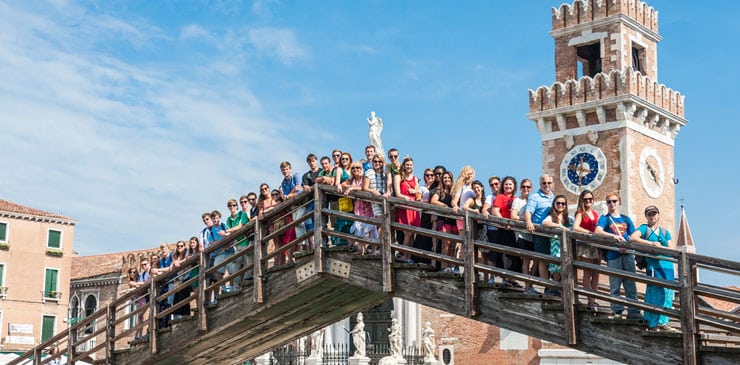In an increasingly interconnected world, the traditional classroom is expanding beyond its physical boundaries. Educational travel offers students and educators a unique opportunity to engage with diverse cultures, histories, and environments in ways that textbooks alone cannot provide. By stepping outside of familiar surroundings, learners can immerse themselves in new experiences that foster personal growth and a deeper understanding of global issues.
This article explores the significance of educational travel, highlighting its benefits for students, educators, and communities. From enhancing academic learning to promoting cultural awareness, educational travel serves as a powerful tool for exploration and discovery.
The Benefits of Educational Travel

- Immersive Learning Experiences:
- Educational travel transforms abstract concepts into tangible experiences. Whether visiting historical landmarks, engaging in local customs, or participating in hands-on activities, students can witness firsthand the subjects they study. For example, a trip to ancient ruins can bring history lessons to life, allowing students to connect with the past in a meaningful way.
- Cultural Awareness and Sensitivity:
- Traveling to different regions exposes students to diverse cultures, traditions, and perspectives. This exposure fosters empathy and understanding, helping learners appreciate the complexities of global issues. Engaging with local communities allows students to challenge stereotypes and develop a more nuanced worldview.
- Personal Growth and Independence:
- Educational travel encourages personal development by pushing individuals out of their comfort zones. Navigating new environments, meeting people from different backgrounds, and overcoming language barriers build confidence and resilience. Students learn valuable life skills, including adaptability, problem-solving, and effective communication.
- Enhanced Academic Performance:
- Research indicates that experiential learning, such as educational travel, can lead to improved academic outcomes. Students who engage in travel often demonstrate higher levels of motivation, critical thinking, and retention of information. By relating classroom lessons to real-world experiences, learners can deepen their understanding and apply knowledge in practical contexts.
- Building Global Citizenship:
- Educational travel fosters a sense of global citizenship, encouraging students to become active participants in their communities and the world. By understanding global issues and their interconnectedness, learners are inspired to contribute positively to society. This sense of responsibility can lead to advocacy, volunteering, and a commitment to social justice.
Types of Educational Travel Experiences
- Cultural Exchanges:
- Cultural exchange programs allow students to live with host families in different countries. This immersive experience promotes language acquisition, cultural understanding, and lifelong friendships. Participants gain insights into daily life, traditions, and values, enriching their educational journey.
- Service Learning Trips:
- Service learning combines community service with educational objectives. Students engage in projects that address local needs while reflecting on their experiences. These trips not only benefit communities but also help students develop leadership skills, empathy, and a sense of social responsibility.
- Field Studies and Research Expeditions:
- Field studies provide opportunities for hands-on learning in specific disciplines, such as biology, geology, or environmental science. Students may conduct research in natural habitats, analyze ecosystems, or participate in archaeological digs. These experiences deepen their understanding of scientific concepts and methodologies.
- Historical Tours:
- Historical tours allow students to explore significant sites that shaped the world. Visiting battlefields, museums, and heritage sites provides context for historical events and encourages critical thinking about the past. Students can engage in discussions about the implications of history on contemporary society.
- Language Immersion Programs:
- Language immersion programs offer students the chance to learn a new language in a native-speaking environment. By interacting with locals, students enhance their language skills and gain cultural insights. This immersive approach accelerates language acquisition and fosters confidence in communication.
Planning an Educational Travel Experience
- Set Clear Objectives:
- Before embarking on an educational travel experience, it is essential to establish clear learning objectives. What do you hope to achieve? Whether it’s gaining cultural insights, enhancing language skills, or exploring historical contexts, having specific goals will guide the planning process.
- Choose Appropriate Destinations:
- Select destinations that align with your educational objectives. Consider places that offer rich cultural experiences, historical significance, or opportunities for hands-on learning. Research local customs, traditions, and logistical considerations to ensure a meaningful experience.
- Incorporate Local Experts:
- Engaging local experts can enhance the educational value of the trip. Collaborate with educators, historians, or community leaders who can provide insights and facilitate learning experiences. Their expertise can enrich discussions and deepen understanding of the local context.
- Encourage Reflection:
- Reflection is a crucial component of educational travel. Encourage participants to keep journals, engage in group discussions, or create presentations about their experiences. Reflecting on what they learned helps solidify knowledge and fosters critical thinking.
- Follow Up After the Trip:
- The learning process doesn’t end when the trip is over. Organize follow-up activities to reinforce what students learned during their travels. This could include presentations, projects, or community service initiatives that apply their newfound knowledge.
Challenges and Considerations
- Logistical Challenges:
- Planning educational travel can present logistical challenges, including budgeting, transportation, and accommodation arrangements. Careful planning and organization are essential to ensure a smooth experience.
- Cultural Sensitivity:
- When traveling to different cultures, it is vital to approach experiences with respect and sensitivity. Educators should prepare students to engage with local customs and practices, emphasizing the importance of cultural awareness.
- Safety and Health Concerns:
- Safety is a priority when planning educational travel. Research potential risks and health considerations for the destination. Ensure that participants are informed about safety protocols and have access to necessary resources.
- Accessibility:
- Consider the accessibility of destinations for all participants. Ensure that travel plans accommodate individuals with different needs, allowing everyone to participate fully in the experience.
Success Stories: Inspirational Educational Travel Experiences
- Global Education Movement:
- Organizations like Global Education have pioneered programs that connect students with peers around the world. Through collaborative projects and cultural exchanges, students gain valuable insights and develop friendships that transcend borders.
- National Geographic Student Expeditions:
- National Geographic offers student expeditions that combine inca travel with hands-on learning in areas like wildlife conservation, cultural exploration, and environmental science. These immersive experiences inspire students to become stewards of the planet.
- The Experiment in International Living:
- This organization provides immersive cultural exchange programs for high school students. Participants live with host families, engage in community service, and explore local cultures, fostering global citizenship and cross-cultural understanding.
Conclusion: Transforming Education Through Travel
Educational travel offers a transformative approach to learning, enabling students to explore the world as their classroom. By immersing themselves in diverse cultures, histories, and environments, learners gain valuable insights that extend far beyond traditional education.
The benefits of educational travel are profound, from fostering cultural awareness and personal growth to enhancing academic performance and building global citizenship. As we continue to embrace the possibilities of learning beyond the classroom, educational travel serves as a powerful reminder of the richness of human experience and the importance of understanding our interconnected world.
In a rapidly evolving global landscape, educational travel equips students with the skills, knowledge, and empathy needed to navigate the complexities of the modern world. By exploring the world as their classroom, learners can build a brighter future for themselves and their communities, one journey at a time.
Read Also About Entrepreneurial Knowledge is the foundation for building a successful business and navigating the challenges that come with it.

